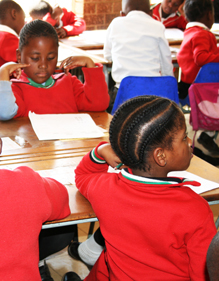|
Getting your Trinity Audio player ready...
|
 In this, the fourth of our six-part series on the unfolding education crisis, we pick apart the roles and powers of the various investigative and administrative agencies involved with the Limpopo case, and identify what they are doing to resolve the crisis.
In this, the fourth of our six-part series on the unfolding education crisis, we pick apart the roles and powers of the various investigative and administrative agencies involved with the Limpopo case, and identify what they are doing to resolve the crisis.
Media professionals are free to use all copy and photographs from this series on condition Corruption Watch is credited as the source.
A serious failure on the part of the government and the provincial and national education departments: this is what the ANC’s National Executive Committee called the non-delivery of textbooks in Limpopo, in July this year. It called for decisive action to be taken against “any official found guilty of any misdemeanour”.
A multi-disciplinary investigation into Limpopo’s education department was put in motion, prompted by the slow reaction of Basic Education Minister Angie Motshekga to the crisis and the resulting public outrage. Evidence of possible fraud and mismanagement uncovered by the department’s intervention team at the start of this year added fuel to the fire.
There also seemed to be pressure on the national government to dispel rumours that Limpopo was being targeted for national intervention because it was seen as a stronghold of Julius Malema, the former ANC Youth League leader who has fallen out of favour with the parent body.
One indication of the slow reaction of the Basic Education Department was Motshekga’s decision to cancel the contract with procurement and distribution company EduSolutions in April. This came a month after the Special Investigating Unit (SIU) was mandated to conduct a forensic investigation into the province’s departments of Education, Roads and Transport, Provincial Treasury, Health and Social Development, and Public Works.
There are at least five investigations being conducted into the Limpopo Education Department. Some overlap, but most have different areas of focus. The reports from the units that form part of the anti-corruption task team, namely the SIU and the Directorate for Priority Crime Investigation (Hawks), are being handed to the National Treasury, which is co-ordinating intervention efforts in Limpopo.
Presidential Task Team report
A Presidential Task Team, headed by Deputy Finance Minister Nhlanhla Nene, has already submitted its interim report to President Jacob Zuma. And according to presidential spokesman Mac Maharaj, who spoke to Corruption Watch, the team is expected to release its final report in the next few days.
However, Democratic Alliance spokeswoman Annette Lovemore said Basic Education Deputy Minister Enver Surty confirmed in a parliamentary question on 29 August, that the Presidency received the report in August. A Treasury official also confirmed to Corruption Watch that the report had been handed over but confirmation could not be received from the Presidency.
The Presidential Task Team report is intended to be a fact-finding mission rather than a criminal investigation, but it is expected by many to decide the fate of Motshekga, who is also the president of the ANC Women’s League.
The minister is also facing criticism for her handling of education problems in Eastern Cape and Northern Cape, among other provinces, and for her failure to create norms and standards relating to school infrastructure, as she allegedly undertook to do. This has led to a court case with Equal Education, which is to be heard in November in the Bhisho High Court. Motshekga is also allegedly being investigated for a possible family link with some education department deals.
Finance Minister Pravin Gordhan, in a parliamentary reply to Cope in May, said that at least nine cases involving Department of Education officials have been referred to the South African Police Service for further investigation. The SIU investigation recommended that disciplinary action be considered against at least 20 officials in the department; that process is under way.
Officials from other Limpopo departments also face criminal action, according to Gordhan. Four cases have been referred to the police relating to Public Works, six cases from Roads and Transport, and 19 from Health and Social Development.
McIntosh Polela, the Hawks spokesman, said the directorate was looking into about 30 departments in the province. It was also examining the awarding of contracts to companies that supplied the departments, and the terms of those contracts. He could not say how many companies were being investigated.
It is believed that the task team is looking at the deals involving suppliers Aurecon Joint Venture, in which Andrianis Johannes van Rensburg has a stake. Van Rensburg is allegedly a friend of Education MEC Dickson Masemola. The company, together with its joint partners Tubatse Consulting and MOT Professional Service Consultancy, was awarded a R95-million contract in September 2010 to provide project management services. But it was paid R150-million.
Gobodo Forensics, hired by the National Treasury to investigate irregularities in the department, found “significant deviation” from the tender initially entered into with Aurecon JV. It was found that in some instances the company was paid R1,5-million more than the monthly limit. Aurecon has denied fraud was involved, saying it was additional work that came from a backlog.
Another supplier under investigation is EduSolutions, which was awarded a R680-million contract for the procurement and distribution of textbooks, educational toys, science kits and other materials on a three-year contract, ending in 2013. Shaun Battlemann, the head of EduSolutions’ parent company, African Access, is a champion and funder of the Jacob Zuma Education Trust. This relationship has raised questions about his company’s appointment over 22 other bidders.
An asset registry tender awarded to Nhluvuko Consulting Joint Venture, which was paid R43.5-million more than their contract stipulated, is also under investigation.
Polela said the investigation into the department was nowhere near complete. “It’s early days yet and the forensic aspect is time-consuming and detailed.” Both the SIU and the Hawks have beefed up their teams in the province, with five people added to the Hawks team, to speed up the investigation. All the reports from these divisions are handed to the National Treasury.
Court cases under way
Section27
Section27 has submitted an application to the High Court calling on the Department of Basic Education to finish distributing textbooks in Limpopo. It wants catch-up classes and a guarantee next year’s textbooks will be delivered on time. It disputes the department’s claims that textbook delivery has been completed. The case will be heard on September 27. Section27 argues that Limpopo students in grades 1, 2, 3 and 10 are still without books for 2012.
Equal Education
The advocacy group Equal Education launched a case in the Bhisho High Court in March, which is to be heard on November 20, demanding that Motshekga implement minimum standards and norms relating to school infrastructure. Its chairperson, Yoliswa Dwane, who has been vocal about Limpopo’s failure to deliver textbooks, believes that minimum standards for infrastructure will give the public an understanding of what a school “is supposed to be”.
Investigations under way
Presidential Task Team
Lead by Nene, this is a fact-finding mission into the failure of the Limpopo Education Department to deliver textbooks. The team was appointed on July 4, and handed an interim report to the Presidency on July 30. This interim report was not made public.
Public protector Thuli Madonsela
Madonsela is looking into the administration side of the Limpopo textbook saga. This includes determining whether or not the books were ordered as per individual schools’ requirements, and if not, what were the reasons for non-delivery. The investigation will look into the destruction of textbooks and attempt to uncover who ordered this destruction.
Directorate for Priority Crime Investigations
The Hawks is looking into possible criminal prosecution of officials and suppliers.
Special Investigating Unit
In terms of a proclamation in March this year, the SIU was mandated to investigate five Limpopo departments. Its task is to look for possible maladministration, unlawful or improper conduct by officials, unlawful appropriation or expenditure of public money or property, and irregular or approved practices that have a bearing on state property.
Treasury
The task team is reporting to the National Treasury, and had referred 38 cases for criminal investigation by May this year. It also appointed Gobodo Forensics to assist with research into the province’s contracts.
Corruption Watch
The anticorruption body has been approached to look into the legality of the appointment of EduSolutions by the Limpopo Education Department for the procurement and delivery of learner materials.
Reports already compiled
Three reports relating to the department that raise issues and concerns have helped to guide the initial investigation:
Prof Mary Metcalfe: a report by the former Higher Education director-general was compiled in response to the department’s assertion that 98 percent of textbooks were delivered to Limpopo pupils, after schools had been without books for seven months. It found that despite the extension given for the delivery of textbooks – June 27 – the department’s claim that 98 percent of the books had been delivered was incorrect. It found that by July 7, 22 percent of schools did not have textbooks and many more that did receive textbooks, received incorrect books and quantities.
Advocate Pat Ellis: on January 17 this year, Ellis informed the Department of Basic Education that the contract with EduSolutions was probably invalid. Ellis said he “was confident that a proper case could be made for the contract to be reviewed and declared void”. One the issues he raised was that it was able to abuse the government’s buying power for its own financial ends.
Anis Karodia: the former head of the department’s intervention team in Limpopo issued a circular to Basic Education director-general Bobby Soobrayan and Limpopo Education MEC Dickenson Masemola saying that contracts “[allocated] to a private company (EduSolutions) at an exorbitant tender price had compromised the department” and that the tender should be cancelled as the company was already under investigation. On April 3, he suggested that the Department of Basic Education procure on behalf of the provincial department, cancelling EduSolutions contract on April 26.
Coming up
Next week we will profile EduSolutions, its directors and those of its holding company. We will examine the company’s historical relationship with public procurement, the current contracts that it has with various tiers of government, and the relationships its key directors have with leading public officials.
Previous installments in the series:





